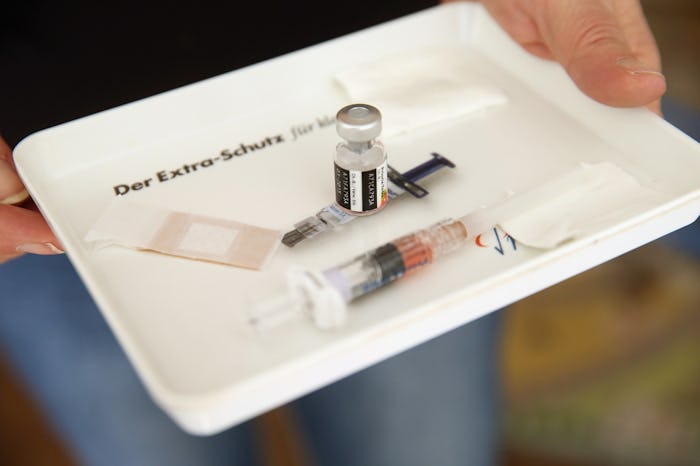Life

These Updated Vaccine Guidelines Show Just How To Keep Your Child Safe
As more and more outbreaks of vaccine-preventable diseases pop up across the United States, the importance of making sure that your child is properly immunized seems ever-clearer. Each year, the Centers for Disease Control and Prevention releases updated vaccine guidelines. And the 2017 recommendations show that, even if you think you may have missed your child's vaccination window, you likely still have a chance to play catch-up. With many immunizations, it's better late than never. (But it's also better right on time than late.)
The 2017 recommended immunization schedule for children below the age of 18 was approved by a host of medical organizations, including the American Academy of Pediatrics, and it covers all the usual vaccine suspects — measles, mumps, and rubella, hepatitis B, tetanus, and more. The chart, with all of its tweaks and footnotes, makes it clear just how much thought doctors put into ensuring that children are protected in the most effective way by their immunization schedule.
If, for whatever reason, you don't manage to get your child vaccinated at the exact recommended time, the schedule also shows a "catch-up schedule," with highlighted green bars indicating the age range at which a child who missed the ideal vaccination window can still receive an effective immunization. The good news is that, with many of the vaccines, parents with a child who has fallen behind have a second chance to keep their children safe.
Of course, this is not to promote a lackadaisical approach to the schedule. As Gail Shust, MD, a childhood infectious diseases expert at the Icahn School of Medicine at Mount Sinai, told WebMD, the immunization schedule is the way that it is so it protects children when they are "most vulnerable" to vaccine-preventable diseases. And each week your child goes without receiving a recommendated vaccine is another week in which he or she could be vulnerable to that disease.
Because even though many of the vaccine-preventable diseases have been nearly eradicated, others have been making scary comebacks, not long after a rise in anti-vaxxing sentiment. Parents and health practitioners in Minnesota, for example, have been contending with the state's worst measles outbreak in decades. Most children suffering from the disease are in the Somali community which, as NBC News reported, has recently been targeted by anti-vaccine activists who claim that vaccinating children can be dangerous. Now, the unvaccinated children who have fallen ill with scary, vaccine-preventable diseases are paying the price.
The CDC's vaccination schedule has a few tweaks for 2017 in order to make sure that your child is getting the right vaccines when he or she needs them most. Make sure to check out the schedule and discuss with your doctor.